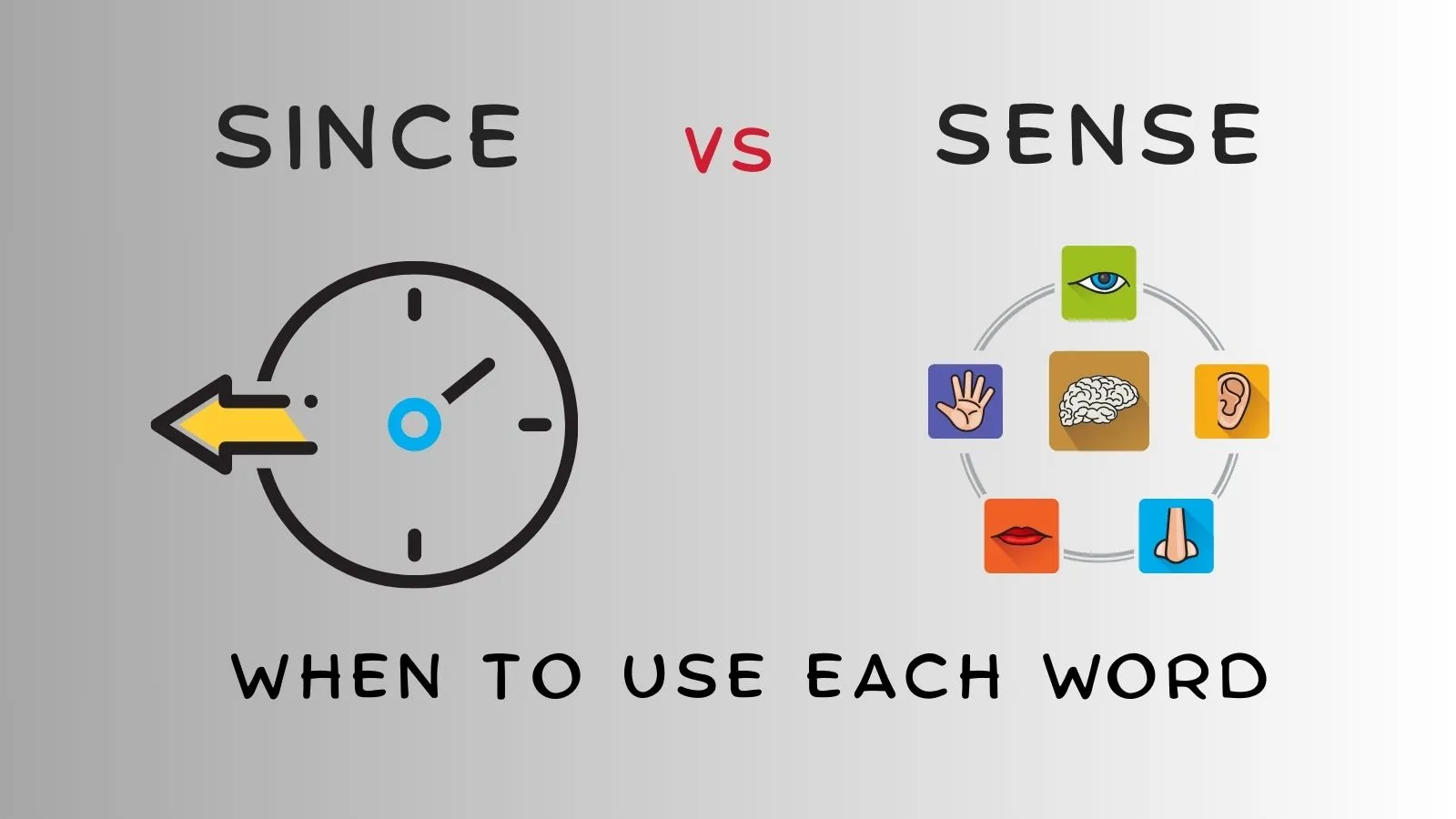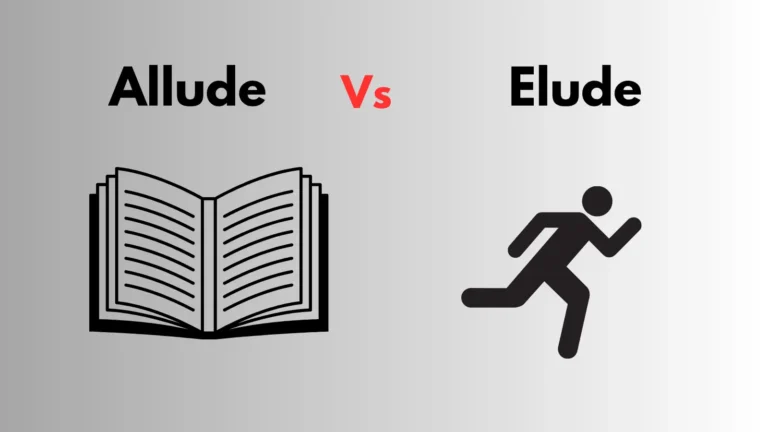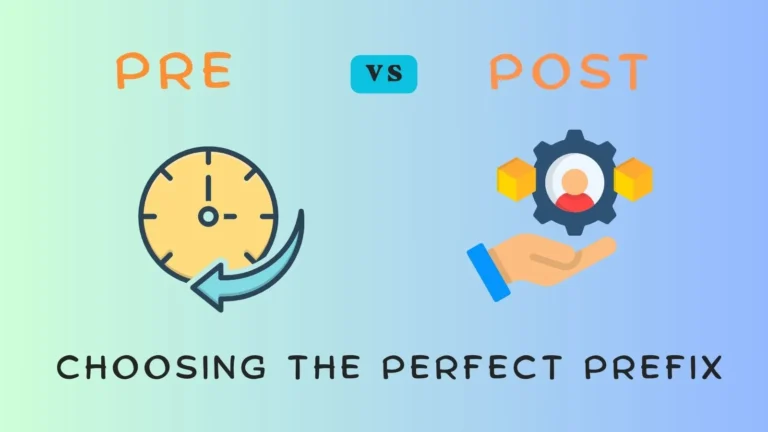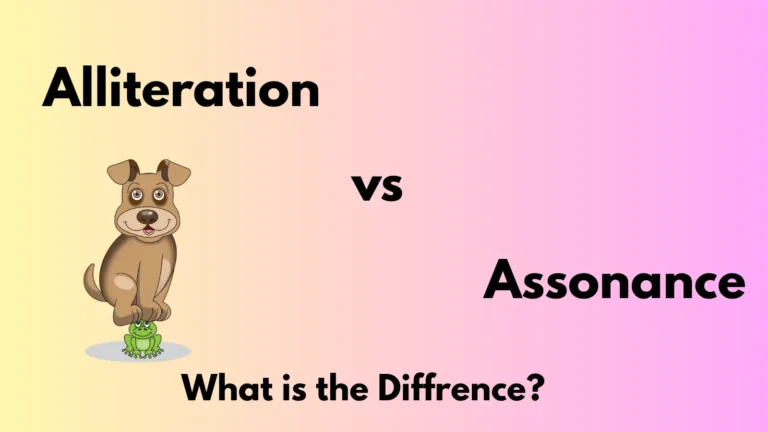Since vs Sense: Understanding When to Use Each Word
Confusing “since vs sense” is a common mistake—even native English speakers mix them up! These words sound alike (homophones) but have entirely different meanings. In this article, we’ll clarify:
- The difference between “since” and “sense”,
- When to use each word in sentences,
- How to avoid mistakes like “makes since” (it’s “makes sense!”), and more.
Let’s take a quick look at there defenitions
Defining “Since vs Sense”: A Breakdown
Let’s start by defining each word’s roles and meanings.
What Does “Since” Mean?
“Since” is used for time or reason. It’s a conjunction, preposition, or adverb.
- As a conjunction (links clauses): time/cause):
Example: “I’ve been writing since 2010.” (time)
Example: “Since it’s raining, let’s stay indoors.” (reason) - As a preposition (marks a starting point in time):
Example: “She’s lived here since 2015.” - As an adverb (introduces a reason):
Example: “Since everyone’s here, let’s start the meeting.”
What Does “Sense” Mean?
“Sense” relates to perception, intuition, or meaning. It can be a noun or verb.
- As a noun (a feeling, perception, or understanding):
Example: “I have a sense of urgency.”
Example: “The sense of smell is vital for survival.” - As a verb (to perceive, feel, or understand):
Example: “I sense that she’s hiding something.”
Example: “Can you sense the change in the air?”
Key Differences: “sense vs since”
Let’s highlight their core distinctions:
| Word | Usage | Examples |
|---|---|---|
| Since | Time or reason | “I’ve been learning English since 2020.” (time) |
| “Since it’s cold, we’ll cancel the picnic.” (reason) | ||
| Sense | Perception, meaning, logic | “She has a sense of humor.” (feeling) |
| “This plan makes sense.” (logic) |
You may find informational :Totalling or Totaling: Which Spelling to Use?
Common Mistakes & How to Avoid Them
1. “Makes Since” vs. “Makes Sense”
The phrase “makes sense” means “is logical” or “is understandable.”
- ❌ Wrong: “Your argument makes since.”
- ✅ Correct: “Your argument makes sense!”
2. Since vs Sense in Sentences
- Time/Reason: Use since.
Example: “I’ve been a vegetarian since 2018.” - Feeling/Understanding: Use sense.
Example: “I have a sense of deja vu.”
3. How to Spell Sense?
- Correct spelling: S-E-N-S-E (noun/verb).
- Common misspells: “since” (time) instead of “sense” (feeling).
When to Use “Since vs Sense”: Quick Rules
Use “since” for:
- Time: Since 2020, I’ve traveled more.
- Reason: Since we’re late, let’s hurry.
Use “sense” for:
- Feelings: She has a sense of humor.
- Logic: That doesn’t make sense.
Examples to Clarify Since vs Sense
Examples of “Since” (Time & Reason)
- Time: “I’ve loved coffee since childhood.”
- Reason: “Since it’s raining, we’ll stay in.”
Examples of “Sense” (Feeling/Understanding)
- Feeling: “I sense a storm coming.”
- Meaning: “The instructions make sense now.”
Mixed-Up Examples
- ❌ Wrong: “Does that make since?”
- ✅ Correct: “Does that make sense?”
The Spelling of “Sense vs Since”
- “Sense” (noun/verb): perception/understanding.
- “Since” (time/cause): always spelled with “i” (SINCE).
- Common errors:
- “Make since” → “makes sense”
- “Sense since” → “sense and since”
Origins of “Since and Sense”
- “Since” comes from Old English sēns, meaning “from that time.”
- “Sense” derives from Latin sentire, meaning “to perceive.”
FAQs: “Since vs Sense” Explained
What’s the difference between since and sense?
“Since” deals with time or reason; “sense” relates to feelings or logic.
How do I remember “sense” vs. “since”?
“Since” = SINCE (think “time” → “i” in the middle).
“Sense” = SENSe (think “senses” like touch, sight, etc.
“It makes since or sense?”
“Makes sense” (logical). “Makes since” is incorrect.
What does “sense” mean?
As a noun: perception (e.g., “a sense of urgency”). As a verb: to perceive (e.g., “I sense danger”).
Real-Life Scenarios Sense or Since
Scenario 1: “Since or Sense” in Sentences
- Wrong: “She’s been here sense 2010.”
- Correct: “She’s been here since 2010.”
Scenario 2: “Makes Since” vs. “Makes Sense”
- Wrong: “Your idea makes since.”
- Correct: “Your idea makes sense!”
Advanced Tips for Mastery
- For “since”: Ask: Is this about time or reason?
- For “sense”: Ask: Is this about feeling or logic?
- Spellcheck: “Sense” has an “e,” while “since” has an “i.”
Examples of “Since and Sense” in Context
Since (Time/Reason)
- Time: “The store has been open since 1950.”
- Reason: “Since the weather’s bad, we’ll cancel the trip.”
Sense (Feeling/Understanding)
- Feeling: “My sense of direction is terrible.”
- Logic: “That solution doesn’t make sense!”
Why “Since” and “Sense” Are Easy to Confuse
- Sound Alike: Both have “sens” in their spelling.
- Similar Length: Both have five letters.
- Common Errors:
- “Does that make since?” → Nope! It’s “make sense.”
- “I sense since yesterday” → Wrong! “I’ve felt this way since yesterday.”
The “Makes Sense” vs. “Makes Since” Debate
The phrase “makes sense” means something is logical. “Makes since” is a common typo, but it’s never correct.
How to Remember the Difference
Use these mnemonics:
- **”Since” = SINCE (time: “SINCe” = SINgular time).
- “Sense” = SENSE (think of your five senses: see, hear, touch, taste, smell).
Secret Tip:
Remember: Sense has an E for Emotion. Since has an I for In time.
Example: The sense of adventure (feeling). vs. “I’ve traveled since 2010 (time).
Words to Replace “Since” or “Sense”
For “Since” (time/reason):
- Time: “from,” “as of,” “from the time.”
- Reason: “because,” “as,” “due to.”
For “Sense” (feeling/meaning):
- Perception: “feel,” “notice,” “perceive.”
- Understanding: “meaning,” “interpretation,” “significance.”
The History of “Since” and “Sense”
- “Since”: From Old English sins, meaning “from that time.”
- “Sense”: From Latin sensus (“perception”), linked to emotions and logic.
Conclusion: Be a “Since vs. Sense” Champion!
Now you know:
- “Since” = time or reason.
- “Sense” = feeling or logic.
- Avoid “makes since”—always “makes sense!”
Final Tips for Success
- Practice with sentences.
- Use mnemonics (e.g., “since” = time, “sense” = five senses).
- Spellcheck: “sense” has an “e,” “since” has an “i.”
References for Accuracy
- Oxford English Dictionary:
- Merriam-Webster:





